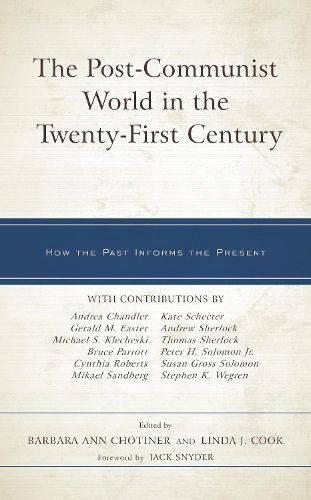Readings Newsletter
Become a Readings Member to make your shopping experience even easier.
Sign in or sign up for free!
You’re not far away from qualifying for FREE standard shipping within Australia
You’ve qualified for FREE standard shipping within Australia
The cart is loading…






The Postcommunist World in the Twenty-First Century presents studies by senior scholars and practitioners that are highly relevant to contemporary political challenges. The democratic vision that accompanied the collapse of communist regimes in the Soviet Union and East Central Europe has been replaced by a range of authoritarian, semi-authoritarian and democratic regimes, and growing division between Western and Russian influence. Russia’s invasion of Ukraine has led to renewed tensions and international crisis. China, which presents major challenges to the US, Europe, and the global order, has emerged as a critical actor in the international conflict. The need to understand the internal dynamics and international behavior of communist and authoritarian regimes is more urgent at this time. The expertise provided by the volume’s contributors is especially timely, offering new insights into the past and contemporary politics of these states, the agendas driving their behavior, regimes’ domestic strengths and weaknesses, and the role of leaders’ differing perceptions in exacerbating international conflict. Practitioners demonstrate how such knowledge can inform effective policy and ameliorative efforts.
$9.00 standard shipping within Australia
FREE standard shipping within Australia for orders over $100.00
Express & International shipping calculated at checkout
The Postcommunist World in the Twenty-First Century presents studies by senior scholars and practitioners that are highly relevant to contemporary political challenges. The democratic vision that accompanied the collapse of communist regimes in the Soviet Union and East Central Europe has been replaced by a range of authoritarian, semi-authoritarian and democratic regimes, and growing division between Western and Russian influence. Russia’s invasion of Ukraine has led to renewed tensions and international crisis. China, which presents major challenges to the US, Europe, and the global order, has emerged as a critical actor in the international conflict. The need to understand the internal dynamics and international behavior of communist and authoritarian regimes is more urgent at this time. The expertise provided by the volume’s contributors is especially timely, offering new insights into the past and contemporary politics of these states, the agendas driving their behavior, regimes’ domestic strengths and weaknesses, and the role of leaders’ differing perceptions in exacerbating international conflict. Practitioners demonstrate how such knowledge can inform effective policy and ameliorative efforts.